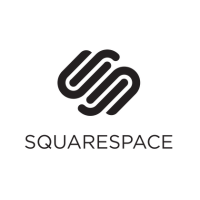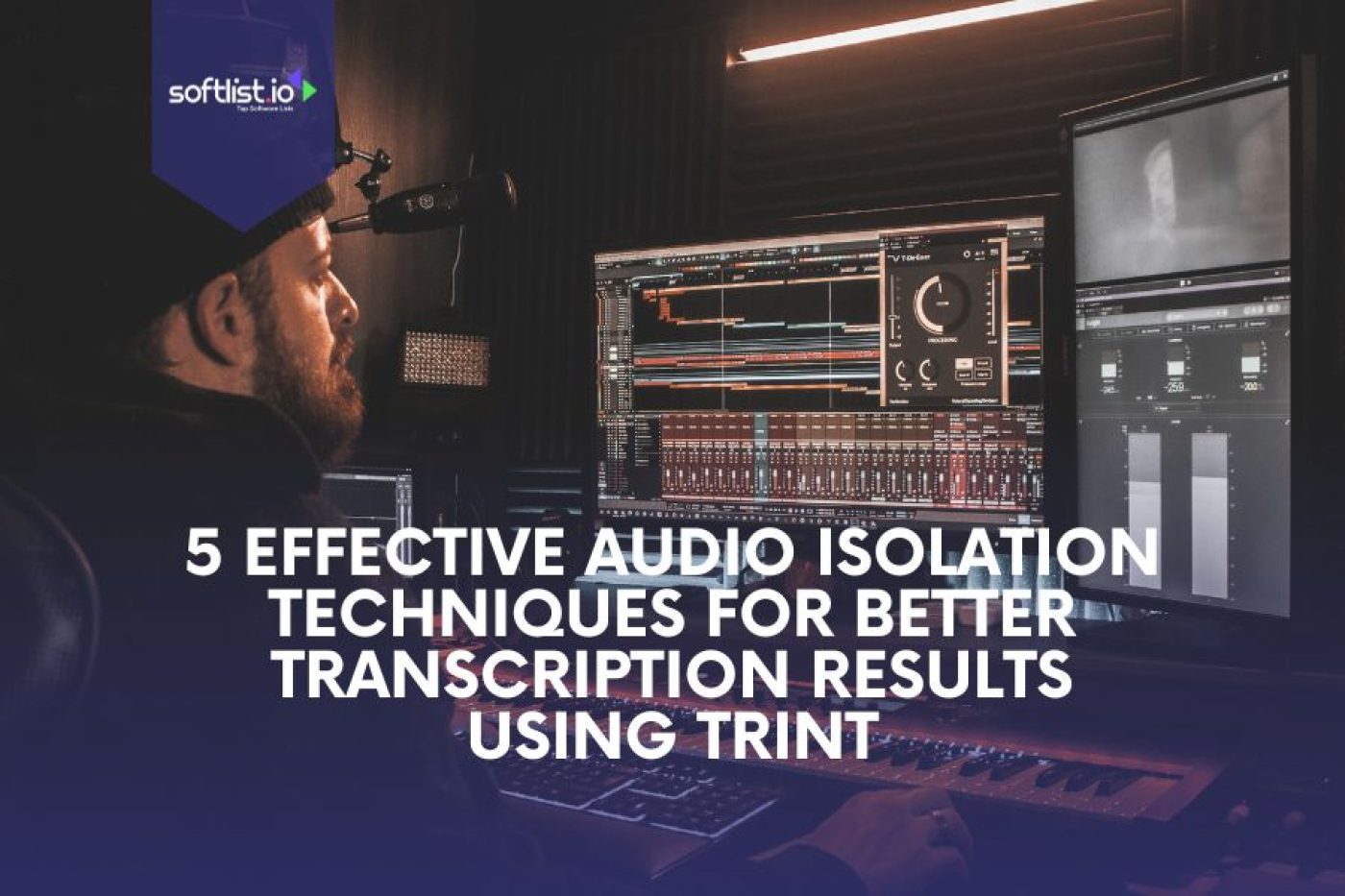Choosing the best e-commerce platform is essential for both business owners and buyers who want to thrive in today’s digital marketplace. With a range of platforms around, from giants like Shopify and WooCommerce to innovative newcomers, selecting the right web platform makes a real difference.
Whether you’re looking to grow a business or shop confidently, finding a platform that gives you trusted sellers and great deals is key. Our guide to the top 11 e-commerce platforms will help you choose the best e-commerce platform that fits your needs, so you can buy and sell with ease in a secure, reliable online space. Discover which platform you should choose to make the most of your e-commerce journey.
Key Takeaways
- Diverse Needs, Diverse Platforms: Whether you’re an emerging business or a seasoned enterprise, the right e-commerce platform aligns with specific needs. From Shopify’s user-friendly setup for small business owners to Adobe Commerce’s advanced customizations for large enterprises, there’s a solution for every stage of business.
- Feature-Packed for Growth: Essential features like scalability, mobile responsiveness, and integration capabilities play a critical role in online success. Prioritizing these can streamline operations, support growth, and optimize customer experience.
- Consider All Costs: Subscription, transaction, and add-on costs vary by platform and can significantly impact profitability. Carefully evaluating these financial aspects alongside operational needs is crucial to selecting the best platform for long-term success.
Overview of E-Commerce Business Platforms

Source: Canva
The variety of platforms can be overwhelming, but understanding the fundamental aspects can guide you in making an informed choice. Catering to diverse needs, from small businesses seeking simplicity to larger enterprises requiring robust solutions, e-commerce platforms tailor experiences to drive sales and customer engagement. This section will explore different tools and platforms shaping e-commerce trends today.
Types of E-Commerce Platforms
When selecting an e-commerce platform, it’s important to understand the different types available, as the platform you choose can greatly impact your online store’s success. Each type of platform is designed with specific functionalities to meet different needs and levels of technical expertise, meaning there’s something for everyone—whether you’re looking to set up a small shop or manage a large, omnichannel business.
- SaaS Platforms: This type of platform, including popular options like Shopify and BigCommerce, provides a cloud-based, managed solution where hosting, security, and updates are all handled by the provider. A SaaS platform is one that makes it easy to set up an e-commerce website with essential features right out of the box, making it perfect for those who want a streamlined setup with minimal tech requirements.
- Open-Source Platforms: Open-source platforms, such as WooCommerce and Magento, give users full control over customization and development, offering flexibility that’s unmatched. For users who want to create custom ecommerce functionality or add unique features to their stores, this type of platform gives them the freedom to build and enhance their site as they choose—though it does require some technical know-how.
- Headless Commerce: If you’re aiming to deliver seamless shopping experiences across multiple channels, headless commerce is an ideal choice. This type of platform separates the front end from the back end, allowing businesses to present their products on any page or device effortlessly. With headless commerce, companies can deliver high-performing and flexible e-commerce experiences that adapt easily to new touchpoints and integrate with other systems.
In exploring these e-commerce platforms, consider the ecommerce features you need and the type of experience you want to provide. Finding a platform that makes sense for your business will help ensure a reliable, scalable online store that meets both your goals and your customers’ needs.
The 11 Best E-Commerce Platforms

Source: Canva
Selecting the right e-commerce platform can feel like choosing the perfect tool from a diverse set. Each has its strengths and might cater to different needs whether you’re building a new online store or optimizing existing operations. Here, we’ll break down the 11 best e-commerce platforms that can take your business to the next level.
Shopify: Revolutionizing the E-Commerce Scene
Source: Shopify
As one of the best e-commerce platforms available, Shopify is a leading e-commerce solution that empowers businesses by transforming complex operations into a streamlined online experience. Known for being a user-friendly platform that’s equally suited to beginners and experienced entrepreneurs, Shopify simplifies the process of building and managing a storefront, meaning users can focus on growth rather than logistics.
Whether you’re starting a new brand or scaling up an established store, Shopify’s advanced e-commerce features and extensive customization options make it a top choice in the digital marketplace. For those seeking the best e-commerce platform to drive their business forward, Shopify is a platform that’s built to support every step of the journey. Choose a platform that offers reliable, scalable e-commerce functionality, and explore why Shopify is one of the top picks for sellers who want the best in online retail.
User-Friendly Interface and Scalability
Shopify’s appeal as one of the best e-commerce platforms starts with its intuitive design, enabling users to launch an ecommerce site quickly, without requiring extensive coding skills. With a clean, easy-to-navigate dashboard, Shopify makes it simple to add products, manage orders, and view analytics. For anyone looking to choose the best ecommerce platform for their business, Shopify stands out by offering a powerful, scalable ecommerce solution that grows alongside your needs, handling increased traffic and sales volume as your ecommerce store expands.
- Intuitive Drag-and-Drop Builder: Customize your storefront with ease, using Shopify’s drag-and-drop builder. This feature provides flexibility and simplicity for setting up a Shopify store.
- Scalability Options: Whether you’re a startup or a larger enterprise, Shopify’s scalability makes it a versatile ecommerce platform for businesses of all sizes. Shopify’s infrastructure adapts as your sales grow, ensuring that your store can handle peak demands and scale seamlessly.
For those ready to choose the best ecommerce platform, Shopify offers reliable ecommerce software that’s designed to support your business at every stage. Explore the opportunities Shopify provides and set up a high-performing online store with ease!
The future of business is yours to shape. Sign up for a free trial and enjoy 3 months of Shopify for $1/month on select plans.
WooCommerce
Source: WooCommerce
WooCommerce shines as a go-to solution for businesses that look for an ecommerce platform seamlessly integrated with WordPress. Known for its flexibility and robust customization options, WooCommerce allows users to build an ecommerce site on the platform with near-limitless potential. For those selecting an ecommerce platform, WooCommerce offers a unique advantage in the ecommerce space, empowering both small artisan shops and large-scale enterprises to create a highly personalized and fully functional online marketplace.
Whether the platform is used for small businesses or high-traffic online stores, WooCommerce brings the tools necessary for a successful ecommerce experience. With so many different ecommerce platforms available, choosing an ecommerce solution like WooCommerce provides businesses with a standalone ecommerce platform that can grow alongside them, adapting to diverse and evolving needs.
Seamless Integration with WordPress
WooCommerce’s seamless integration with WordPress offers unmatched convenience, making it a top choice for ecommerce brands and those who want a platform that naturally extends their existing site. As a powerful tool in the world of ecommerce platforms, WooCommerce transforms any WordPress site into a feature-rich, user-friendly ecommerce store with ease, eliminating the need for complex coding.
- User-Friendly Setup: For users already familiar with WordPress, WooCommerce provides an intuitive setup process. This platform is also ideal for those looking for an ecommerce solution where managing inventory, configuring tax options, and adding product categories are easily handled through the familiar WordPress dashboard.
- Content Flexibility: WooCommerce is a cloud-based platform that supports various product types, from physical goods to digital downloads and even subscriptions. Among many platforms, WooCommerce stands out as one that best suits a wide range of ecommerce needs, offering a flexible solution for businesses looking to diversify their product offerings.
With so many platforms available, WooCommerce is among the best ecommerce software solutions for businesses that are looking for a platform that supports a dynamic and customizable store experience. This powerful tool makes it simple to build a site that aligns with your brand, proving itself a worthy competitor among the top two platforms in ecommerce.
Customization and Extensions
One of WooCommerce’s standout features is its extensive customization possibilities, making it a highly adaptable e-commerce platform for your business. With a vast range of themes and plugins, WooCommerce enables businesses to tailor every aspect of their ecommerce website, ensuring a cohesive brand experience across their stores.
- Unlimited Themes: WooCommerce supports an extensive selection of themes that can be customized to match any aesthetic. This advanced ecommerce feature allows business owners to maintain brand consistency and enhance the customer experience on every page
- Extensive Plugin Ecosystem: WooCommerce’s wide plugin market offers ecommerce tools for payment processing, shipping solutions, and SEO optimization. These plugins allow for tailored enhancements that streamline store operations, making it the right ecommerce platform for those looking for flexibility.
WooCommerce remains a top contender among the best e-commerce platforms because it merges simplicity with powerful customization and extensive support. As e-commerce continues to expand, choosing a versatile and scalable platform like WooCommerce helps business owners sell efficiently and effectively.
No matter what success looks like for you, you can do it with WooCommerce. Our WordPress-based ecommerce platform helps merchants and developers build successful businesses for the long term.
Inkthreadable: A Print-on-Demand Solution
Source: Inkthreadable
Inkthreadable is a notable player in the e-commerce space, particularly for those interested in the print-on-demand model. It offers an innovative solution that integrates with leading e-commerce platforms, perfectly catering to businesses that prioritize custom printing and seamless fulfillment. Here’s what makes Inkthreadable an appealing choice for print-on-demand services.
Integration with Top E-Commerce Platforms
Inkthreadable stands out by offering straightforward integrations with popular e-commerce platforms, making it a must-consider for UK-based merchants and beyond.
- Platform Compatibility: They connect effortlessly with major platforms such as Shopify, WooCommerce, and Etsy, ensuring that sellers can manage their stores efficiently with minimal technical hassle. Discover the platforms they integrate with this detailed explanation.
- Easy Setup Process: Inkthreadable simplifies the process of connecting your store to its system, allowing you to start selling quickly without the need for extensive technical know-how. Visit their guide on setting up your store for a step-by-step setup.
Print-on-Demand and Fulfillment
One of Inkthreadable’s core strengths lies in its print-on-demand capabilities, a model that eliminates the need for upfront inventory – an ideal choice for expanding product lines without the risk.
- Efficient Fulfillment Processes: They handle the entire fulfillment process, from printing to delivery, allowing sellers to focus purely on marketing and growing their brand. You can learn more about how this model transforms sales with Inkthreadable by checking their print-on-demand service.
- Eco-Friendly Options: Inkthreadable also emphasizes sustainability, offering eco-friendly printing options that can appeal to environmentally conscious consumers.
Comprehensive Customization
With Inkthreadable, customization isn’t just an option—it’s the norm. This platform provides a wide range of products ready to be customized, empowering businesses to offer unique items that resonate with their audience.
- Variety of Products: From clothing to home decor, the diversity in product options allows brands to diversify their offerings swiftly. Businesses can cater to niche markets, enhancing their competitive edge by offering unique and curated product lines.
- Design Flexibility: Inkthreadable features tools to help refine product design, allowing sellers to create visually appealing custom products with ease. Delve into what you can potentially achieve with Inkthreadable on their main page
Connect the world's leading e-commerce platforms with Inkthreadable. Easy setup, no coding required.
Flexible Shipping Solutions
Efficient shipping is a crucial component of customer satisfaction, and Inkthreadable excels by providing reliable solutions that keep customers happy.
- Global Shipping Capabilities: Sell your products on a global scale with confidence, as Inkthreadable supports international shipping with competitive shipping rates and tracking options.
- Automated Processes: The shipping process is automated to ensure accurate and timely delivery, minimizing the potential for human errors and resulting in increased customer satisfaction.
Integrating Inkthreadable with your e-commerce platform not only enhances your print-on-demand capabilities but also allows you to leverage a sustainable business model with endless customization options. As you delve deeper into the world of best e-commerce platforms, consider Inkthreadable as a versatile partner in your journey towards scale and innovation. For more insights into optimizing your e-commerce strategies, explore beneficial dropshipping tools that complement Inkthreadable’s offerings.
ShipBob: E-Commerce Fulfillment Simplified
Source: ShipBob
ShipBob is carving out a niche as a comprehensive e-commerce fulfillment service catering to businesses seeking reliable 3PL solutions. With its cloud-based logistics platform, ShipBob provides efficient supply chain management, helping brands focus on growth instead of logistics.
Tailored Fulfillment Solutions
ShipBob excels in offering customized fulfillment services that streamline operations for small to medium-sized e-commerce businesses aiming for extensive reach without the burden of logistical intricacies.
- Order Management: ShipBob’s system allows seamless management, including editing and customizing orders in real-time. This flexibility is crucial for businesses that experience fluctuating demand and require a robust order management system to stay agile and responsive. Learn more about its integration with Squarespace.
- Inventory Transparency: Stay in control with real-time tracking of stock levels. Businesses can monitor inventory movements and make informed decisions to avoid stockouts or overstocking, enhancing operational efficiency and reducing costs.
Strategic Distribution and Warehousing
Aligning with ShipBob means leveraging its network of strategically placed fulfillment centers, optimizing delivery, and ensuring customer satisfaction through prompt service.
- Wide Reach and Fast Delivery: With multiple fulfillment centers situated strategically, ShipBob enhances delivery speed and reduces shipping costs, a vital aspect for businesses seeking to improve their customer service while slashing overheads.
- Scalable Warehousing Solutions: ShipBob empowers businesses to scale effortlessly without friction, making it suitable for seasonal surges or rapid growth phases. This adaptability aligns well with brands aiming to expand their reach across domestic and global markets.
For in-depth insights, explore how ShipBob is revolutionizing e-commerce fulfillment.
Discover the power of omnichannel analytics and reporting through our dashboard, while we take care of picking, packing, and shipping for you.
Squarespace: Integrating Aesthetic Design with E-Commerce

Source: Squarespace
Squarespace has carved a niche in the e-commerce market by offering a platform that combines striking design with functional commerce capabilities. As a choice for creatives and service-based businesses, it offers the tools needed to create visually appealing stores alongside seamless e-commerce integration.
Design-Focused Platform
Squarespace is celebrated for its beautiful, polished templates that require no coding skills to implement. If you view your brand as a masterpiece needing the right showcase, Squarespace can transform your vision into an attractive reality.
- Elegant Templates: Offering a wide range of theme options, Squarespace allows customization that reflects the unique personality of your brand. The platform’s intuitive design tools make it accessible regardless of technical proficiency. Delve into their design offerings on Squarespace’s builder page.
- Responsive Design: Ensuring your site looks stellar on any device is critical, and Squarespace delivers responsive templates that adapt smoothly to different screens.
Start with a flexible designer template or build your own, then customize to fit your style and professional needs using our drag-and-drop website builder.
Adobe Commerce (Magento)
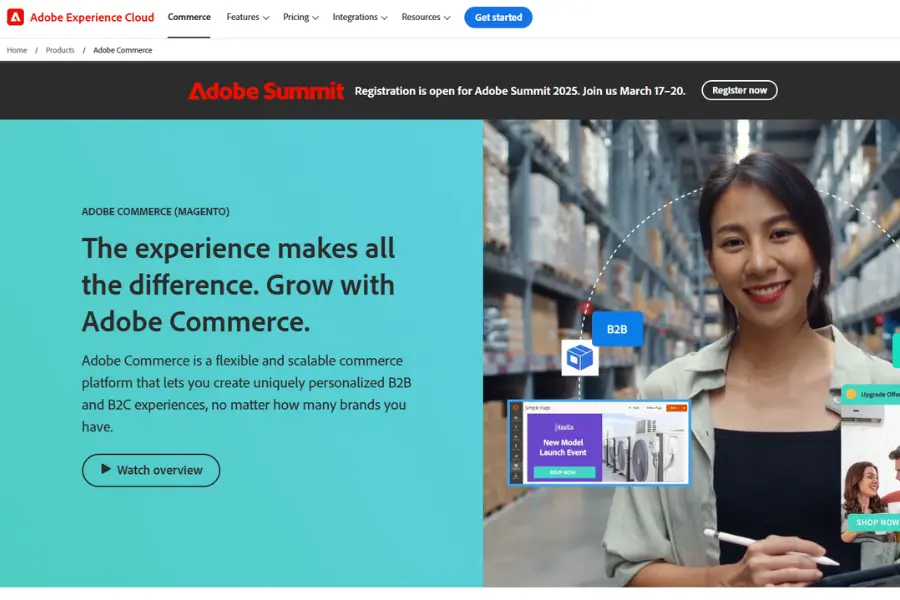
Source: Adobe Commerce
Often hailed as a powerhouse in the e-commerce platforms arena, Adobe Commerce (formerly known as Magento) excels in providing comprehensive features tailored for businesses seeking deep customization and scalability. This section explores what makes Adobe Commerce a top choice for large-scale operations and enterprises.
Flexibility and Customization
With Adobe Commerce, you get an open-source solution that offers unmatched customization capabilities. It serves those who need specific functionalities tailored to business requirements, allowing for intricate designs and features, unlike one-size-fits-all SaaS platforms like Shopify.
- Open-Source Platform: Adobe Commerce invites developers to tweak and refine their own solutions, offering a playground to build unique e-commerce experiences. You can explore more about this flexibility on Magento, now Adobe Commerce
- Theming and Layouts: It provides limitless theming capabilities that enable businesses to align their online presence with their branding strategies.
BigCommerce: Powering E-Commerce with Scalability and Flexibility
Source: BigCommerce
BigCommerce stands as an icon of scalability and integration. BigCommerce offers a robust platform that caters to ambitious businesses aiming to drive growth. With its extensive set of tools and approachable user interface, it simplifies the complexities of online selling.
Unmatched Flexibility and Scalability
BigCommerce sets itself apart with its open SaaS platform, which offers both flexibility and scalability. This means you can start small and expand as your business grows, without hitting any roadblocks.
- Open SaaS Platform: BigCommerce lets you customize your store extensively, offering greater control over how your e-commerce site looks and functions on its open-platform flexibility.
- Scalability Options: One of the strongest appeals of BigCommerce is its capacity to grow alongside your business. Features such as multi-storefront capabilities within a single dashboard make it a smart choice for managing complex operations.
Key Features for Business Growth
BigCommerce provides features designed to help businesses who are looking to increase their reach and efficiency in the online marketplace.
- SEO Optimization Tools: Ensuring your store ranks well on search engines is straightforward with BigCommerce. Built-in SEO functionalities help boost your site’s visibility and attract organic traffic.
- Marketing Automation: Automate your marketing efforts to tailor consumer interactions and enhance customer experiences, thus building a loyal customer base.
- Extensive Integration Options: Integrating various software applications is seamless with BigCommerce, allowing you to connect everything from payment gateways to CRM systems effortlessly.
Engaging User Experience
The user experience on BigCommerce is smooth, from both a seller’s and buyer’s perspective. The platform supports engaging storefront designs and a user-friendly interface, keeping online shopping a delightful experience.
- Single-Page Checkout: Fast and simple checkouts are pivotal for reducing cart abandonment rates and boosting conversion rates.
- Customization Options: With endless themes and design tools, you can create a user experience that aligns perfectly with your brand aesthetics.
BigCommerce is well-equipped to handle the demands of being one of the best content management systems, paving a path towards easier management and growth of your online store. By focusing on flexibility, robust feature offerings, and cost-effective solutions, it serves as a reliable partner for any e-commerce business ready to elevate its market presence.
Wix eCommerce
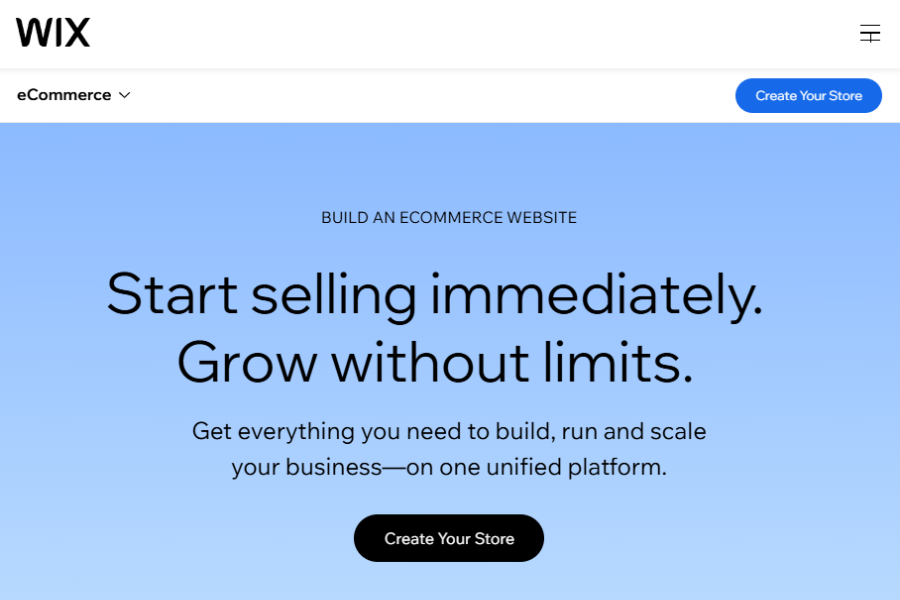
Source: Wix
Wix eCommerce is an inviting platform for individuals exploring the possibility of running their own online stores. Known for its usability and flexibility, Wix provides a comprehensive solution that suits all, from small businesses to personal projects looking to establish an online presence without an intimidating learning curve.
But what makes Wix eCommerce stand out in a crowded field of competitors?
User-Friendly Design
Ease of use is at the core of Wix’s eCommerce offerings. With a simple setup process, anyone can craft an eye-catching storefront without prior technical skills.
- Drag-and-Drop Builder: Wix’s intuitive drag-and-drop functionality allows you to customize your online store effortlessly, even as a beginner. You can choose from various templates and personalize them to align with your brand identity.
- Flexible Design Options: Whether you’re selling clothing, art, or gadgets, Wix offers a multitude of design choices that help create an engaging shopping experience that reflects your niche.
Etsy: A Haven for Unique Creations and Global Reach
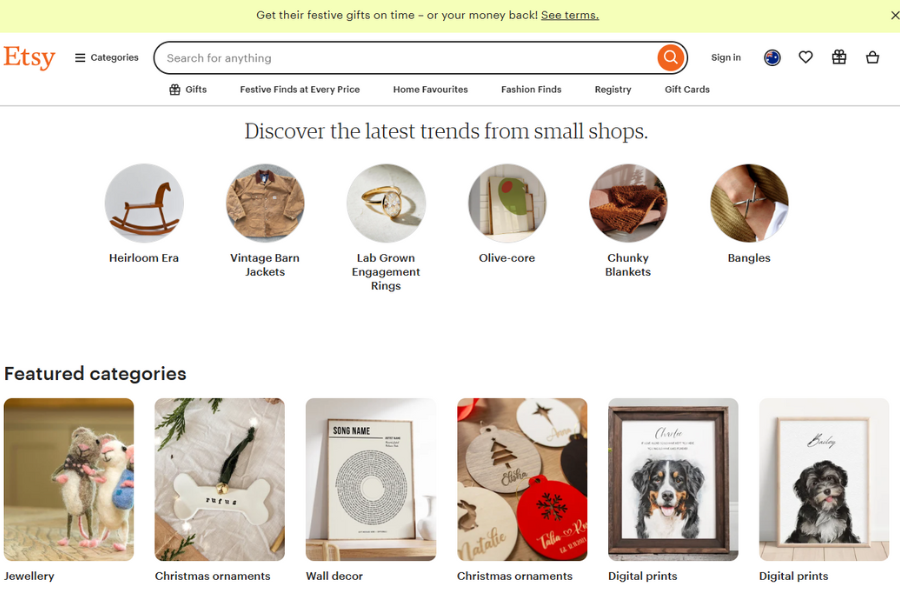
Source: Etsy
Etsy is a renowned e-commerce platform that has established itself as a vibrant marketplace for creatives and small business owners focused on handmade, vintage, and unique factory-manufactured items. It’s where individuality meets commerce, enabling sellers to connect with buyers on a more personalized level. So what’s the secret behind Etsy’s ever-growing popularity and what makes it an appealing choice for businesses aiming to reach a wider audience?
Creative Community and Niche Focus
One of Etsy’s standout features is its community-centered ethos, which encourages sellers to showcase their creativity while offering buyers access to unique, handcrafted goods that aren’t typically found in traditional retail spaces.
- Artisanal Appeal: Etsy’s platform is a treasure trove for handcrafted products, allowing creators to sell distinctive works that reflect their artistry and personal brand. This focus on unique offerings appeals profoundly to consumers looking for one-of-a-kind items, as seen in the breadth of bestselling e-commerce pieces on the marketplace.
- Supportive Seller Community: With a strong community of artisans and crafters, Etsy provides tools and resources designed to help sellers thrive. This camaraderie helps foster continuous learning and growth, turning newcomers into seasoned e-commerce sellers.
Amazon: The E-Commerce Titan
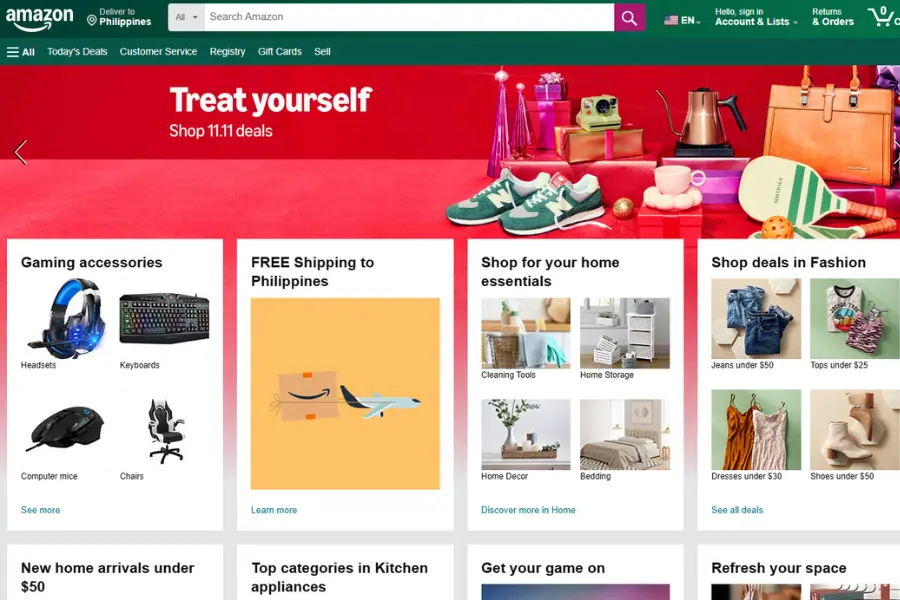
Source: Amazon
Amazon’s pioneering role in the e-commerce industry redefines online shopping. Known for its vast marketplace, this giant accommodates businesses ranging from solo entrepreneurs to global brands. Amazon’s platform offers distinctive advantages, making it pivotal for both buyers and sellers seeking access to the widest range of products and customers.
Expansive Marketplace Reach
Amazon’s extensive reach is one of its strongest suits, allowing businesses to access a global audience with minimal barriers. No matter your product niche, Amazon brings both visibility and opportunity.
- Worldwide Customer Base: The platform’s broad presence spans numerous countries, effectively enabling sellers to tap into international markets without hefty upfront costs. This global reach enhances brand visibility and potential sales.
- Diverse Product Categories: Selling on Amazon means presenting your products alongside millions of others, from electronics to handmade items, making it a go-to for any burgeoning or established product line. For more insights, explore how sellers successfully leverage Amazon’s expansive e-commerce infrastructure.
eBay: The Go-To Marketplace for Buyers and Sellers
Source: eBay
Known for its variety and competitive pricing, eBay’s platform accommodates individual sellers and large enterprises alike. eBay’s dynamic presence in the e-commerce sector makes it a go-to for anyone interested in exploring vast market opportunities.
Diverse Marketplace Offerings
At its core, eBay is recognized for its array of products ranging from electronics to collectibles. The marketplace offers a unique blend of traditional listings and auction formats, catering to different consumer preferences. This diversity makes eBay a top choice for buyers seeking deals and for sellers wanting to reach extensive audiences.
- Auction and Buy-It-Now Options: Whether you’re bidding on hard-to-find items or purchasing outright, eBay provides flexible buying experiences to meet specific desires. This blend of buying formats enables sellers to attract various customer segments—those hunting for bargains and those willing to pay top dollar for the convenience of immediate purchase.
- Wide Range of Categories: Featuring a gamut of categories from electronics to fashion, eBay ensures there’s something for everyone. This remarkable variety brings in a broad audience, enhancing the platform’s appeal to a vast demographic.
Factors to Consider When Choosing an E-Commerce Platform

Source: Canva
Choosing the right e-commerce platform is a crucial step for any business looking to optimize its online presence. This section delineates the essential factors you need to assess when selecting a platform to support your e-commerce needs. A suitable platform can streamline operations, enhance user experience, and ultimately contribute to your business’s success. As you embark on this decision-making process, it’s vital to focus on key considerations that will align with your business goals and customer expectations.
Customization and Flexibility
The ability to tailor your e-commerce platform to meet specific business needs is invaluable. Customization not only affects the appearance of your website but also enhances functionality and user experience.
- Design Options: Look for platforms that offer extensive design templates and customization capabilities. This is crucial for establishing a strong brand identity and ensuring a seamless shopping experience for your customers.
- Modular Flexibility: The platform should allow you to add or remove features as your business requirements evolve. Platforms that provide scalable solutions enable you to adjust the site’s capabilities without revamping the entire system.
Learn more about customization needs through this guide to buying websites.
Scalability and Performance
Your e-commerce platform needs to support your current business size and be able to grow with you. As your business expands, the platform must handle increased traffic and transaction volumes without sacrificing speed or performance.
- Resource Management: Check if the platform offers efficient resource management to sustain operations during high-traffic periods, seasonal sales, and promotional campaigns.
- Load Balancing and Caching: Platforms with built-in load balancing and caching can enhance performance, ensuring quick load times and smooth navigation under heavy loads.
Conclusion
Choosing the right e-commerce platform is pivotal to advancing your business’s digital footprint. Each platform reviewed offers distinct advantages, whether through scalability, integration, or user-friendliness. These tools equip businesses to optimize performance and cater to growing consumer demands.
As diverse needs arise, from handling large volumes with ease on Shopify to leveraging community engagement on Etsy, understanding your business objectives is crucial.
Looking for some great ‘Deals and Promotions’ and ‘Top Product Reviews’ to help you get started? Subscribe to our website, and you won’t miss out on our exclusive promotions and top products!
And if you’re curious about strategies in online business marketing, consider exploring our guide on Outbound Sales Strategies for maximizing sales and profit. It’s packed with insights and strategies to assist in providing the best value for your website and business. Give it a read!
Frequently Asked Questions About E-Commerce Platforms
Understanding the fundamentals through frequently asked questions (FAQs) helps streamline your decision-making process, whether you’re a budding entrepreneur or a seasoned business owner.
What Is the Best E-commerce Platform for Beginners?
Choosing an e-commerce platform as a beginner involves evaluating ease of use and available features. Shopify often tops the list due to its user-friendly interface, comprehensive customer support, and an array of features designed for seamless store creation.
What makes Shopify an attractive choice? Beginner-friendly tools like drag-and-drop website builders and a large app marketplace help you customize your online store without needing technical expertise. eCommerce platforms like BigCommerce also offer valuable resources and uncomplicated setups for those new to e-commerce.
Can I Switch My E-commerce Platform Later?
Switching e-commerce platforms is possible but requires careful planning. What should you consider before making the leap? Assess the data migration capabilities of your prospective platform, support for various functionalities, and compatibility with your existing tools and integrations.
Platforms like WooCommerce allow portability through export/import tools and third-party services, simplifying transitions without major disruptions.
What Are the Costs Associated with E-commerce Platforms?
Understanding costs is crucial when selecting your e-commerce platform. Generally, they fall into three categories:
1. Setup Fees: These are one-time costs for platform installation or migration.
2. Transaction Fees: Some platforms, like Shopify, charge commissions on sales, while others may offer fee-free transactions.
3. Monthly Subscription Fees: Most platforms run on a subscription model with varying tiers to match the size and needs of your business.
Reviewing costs helps avoid unexpected expenses and ensures alignment with your financial planning. Platforms offer tiered pricing options to cater to different needs – for instance, start-ups might choose lower-tier plans, while more established businesses benefit from premium options with advanced features.
How Do I Choose the Right Platform for My Business?
To select the ideal platform, focus on criteria like:
– Customization Options: Select a platform that enables brand uniqueness and flexibility.
– Scalability: Ensure your platform can grow with your business, accommodating increased traffic seamlessly.
– Support and Resources: Look for platforms offering rich support materials and customer service to aid navigation through challenges.
Evaluating your business goals will guide you towards a platform that matches both your current needs and future aspirations. Crafting an effective FAQ page can be part of this process, enabling seamless communication with your prospective vendors.
Are There Free E-commerce Platforms Available?
Yes, free e-commerce platforms are available and can be suitable for start-ups with tight budgets. What’s the catch? They often come with limitations such as fewer customization options or support services and additional costs for add-ons or transaction fees. WooCommerce can be a great starting point, as it’s open-source and extends functionality with paid plugins according to the business’s evolving needs.
Exploring platforms thoroughly ensures informed decisions that align with your strategic goals. For additional insights on commonly asked questions, eCommerce FAQs provide useful guidance on selecting and optimizing your platform use.






